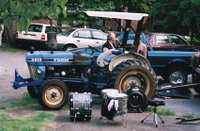
Malcolm Gladwell
The picture has nothing to do with M. Gladwell's book. Just a personal tipping point. :) I've been reading Malcolm Gladwell's first book, The Tipping Point: How Little Things Can Make a Big Difference (2000). I bought the book a year or more ago and eagerly read about the first half before it got shuffled in my bedside stack and overrun with others. Something reminded me of it again recently and I unearthed it. This book is really making me think about how we create neural connections in our brain, and why we do what we do with them, or not. I realize more and more how locked in we are in our thinking processes - I have images of a recent Holiday Inn Express ad I saw, in which a clown reassures a rodeo rider straddling the bull and ready to leave the gate - just lean back and hang on. The rider is reassured and gives a nod to the role of the rodeo clowns in keeping it all together, then learns that the clown is a birthday party clown who stayed at a Holiday Inn Express. Find the link or bridge between why I thought of this ad when thinking of how locked in we are to our thinking processes, and you will have entered the Wonderland of my World.
The Tipping Point is indeed a great intellectual adventure story, as M. Gladwell calls it. And I love great intellectual adventure stories. To me all true intellectual explorations are adventures. Studying the difference between internal and external focuses of thinking, and the amazing phenomenon of once we recognize a pattern, the pattern begins to "appear" everywhere we look, validates again the fact that we are reflective beings. Understanding the world around us in a different way than we may have already thought means we have opened our way of understanding ourselves into new pathways. We may not necessarily be conscious of doing this - of deciding to change our thinking - at first, but we feel the excitement of the change, and this prompts us to do it, more and more, and more consciously.
Gladwell has some great case studies in the book. I'm definitely thinking about my own patterns of thinking and doing and feeling, and feeling the urges and surges of starting my own "positive" epidemic, as he writes, is a thrill. Add to that the thrill of the infinite sensory experience we open our minds to as we learn to love these processes of creation, and wow...that's what I call a Big Bang.
A note to think about:
"As human beings, in other words, we can only handle so much information at once. Once we pass a certain boundary, we become overwhelmed. What I'm describing here is an intellectual capacity - our ability to process raw information. But if you think about it, we clearly have a channel capacity for feelings as well." (176)
We have a lot of ways to illustrate how we have defined our environment, based upon our perception. These illustrations can be markers for us to break down some walls, once we know the blueprint of how we built the shelters, buildings, bunkers, skyscrapers, gazebos in our mind.
Quotes and other links:
"Kant had said that it was Nature herself, and not the mathematician, who brings mathematics into natural philosophy." On Growth and Form, D'arcy Wentworth Thompson (1961).
Another book I'm reading:
A novel called The Brief History of the Dead by Kevin Brockmeier.
Inside the flyleaf: 'Remember me when I'm gone' just took on a whole new meaning.
No comments:
Post a Comment